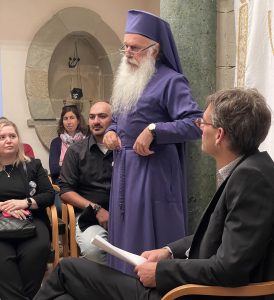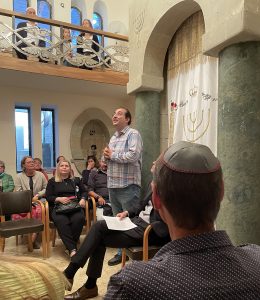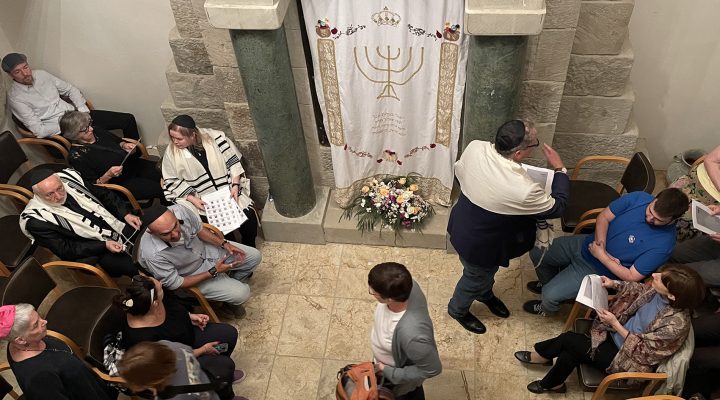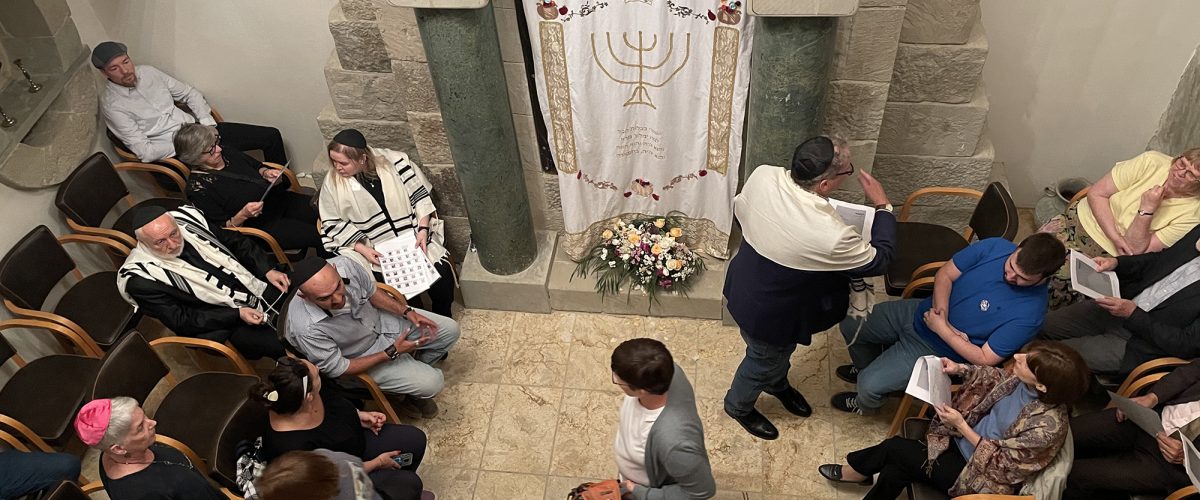Dedication of a synagogue within the confines of a Baptist church in the Republic of Georgia exemplifies the peacemaking potential of interfaith dialogue and relationships, said Paul Hayes, a retired Baptist pastor and former Alliance of Baptists board member.
Hayes was part of an Alliance delegation that attended the Oct. 28 Jewish ceremony at Peace Cathedral, a Baptist congregation in Tbilisi that has included dedicated spaces for Jewish and Muslim congregations within its walls. The Alliance has been an active partner of the community led by Bishop Malkhaz Songulashvili.

Paul Hayes
“We feel we are making a significant contribution to the future of Abrahamic faiths and to a model of what true community can look like,” said Hayes, a Connecticut resident who led congregations in the Alliance and American Baptist Churches USA before his retirement.
The long-awaited ceremony followed years of construction slowed in part by the pandemic and is the latest milestone in the congregation’s ongoing Peace Project, which envisions one facility with separate worship spaces for Christians, Jews and Muslims without merging spiritual practices or identities.
The event was led by local rabbis from the Reform Judaism tradition. “The synagogue is not unique in Tbilisi but the Conservative and Orthodox Jewish communities have not embraced the project,” Hayes said.
The dedication also served as the launch of the Peace Cathedral’s Martin Luther King Jr. lecture event. German interfaith leader Roland Stolte delivered the inaugural lecture in what will be an annual series.
The mosque portion of the Peace Project is scheduled for dedication next spring and will include Suni, Shi’a and Sufi Muslims, Hayes added. “These spaces aren’t huge, but they are huge in terms of their significance in bringing together disparate groups and building interreligious relationships in the community. The cathedral will serve as an interfaith center in Tbilisi that serves minority religious communities.”

Bishop Malkhaz Songulashvili.
The importance of living in communal ways has been illustrated by ongoing military conflicts, including the war in Israel and Gaza which prevented the principal rabbi in the Peace Project from attending the dedication in Tbilisi, he said. “These wars in the background contribute to a particularly poignant message, probably not very welcomed at this point, that Jewish people and Muslims and Christians can work together side by side and work together into the future by building trust through community.”
The church and its Peace Project also demonstrate how Baptists can be better Baptists, said Ken Sehested, former founding director of the Baptist Peace Fellowship of North America and editor of the online journal Prayer & Politics.
While a congregation that is led by a bishop and worships in a cathedral may appear as anything but Baptist, it actually illustrates an embrace of Baptist distinctives such as the autonomy of the local church, he said. The cathedral was founded as First Baptist Church of Tbilisi and is the oldest Baptist congregation in the country.
Taking Jewish and Muslim congregations into their facility exemplifies historical Baptist support for religious freedom, Sehested said. “Peace Cathedral has also taken a very proactive stance in welcoming the LGBTQ community, and a number of their brethren and sistren are not happy about that. That is something else that makes the Baptist Peace Cathedral very distinctive.”
 Nor is there anything un-Baptist about worshiping in the style of Orthodox Christianity, which is the dominant religious tradition in the Republic of Georgia, Sehested said. “It’s the kind of culturation that is good. The church often gets formed by its surrounding culture in harmful ways, but their Orthodox worship style is a wonderfully distinctive practice.”
Nor is there anything un-Baptist about worshiping in the style of Orthodox Christianity, which is the dominant religious tradition in the Republic of Georgia, Sehested said. “It’s the kind of culturation that is good. The church often gets formed by its surrounding culture in harmful ways, but their Orthodox worship style is a wonderfully distinctive practice.”
The cathedral is situated amid elements of Georgian culture that are hostile toward religious minorities and LGBTQ people, he added. “What they’re doing is going against the tide of intercultural and nationalistic violence. They are putting themselves, at significant cost, on the road to having a place where dialogue can happen between Baptists, Muslims, Jews and other religious groups that are distinct minorities in Georgia, where the Orthodox Church runs the place.”
Sehested said the project is reminiscent of Clarence Jordan’s founding of Koinonia Farm, an intentional Christian community in southwest Georgia. Jordan likened the farm to “a demonstration plot for the kingdom of God.”
“He knew it wouldn’t end economic injustice, but that it was a parable of what the kingdom could be like,” Sehested explained. “What the Peace Cathedral is doing is also like a living parable. It’s a story that can be told in every time and place. It’s a hopeful sign that the future is not circumscribed, that we may in fact have the opportunity to cross this wall of hostility between different religious groups. This is a bold, brave thing they are doing.”


